March 14, 2018
Happy Birthday, Mitzi Bytes!
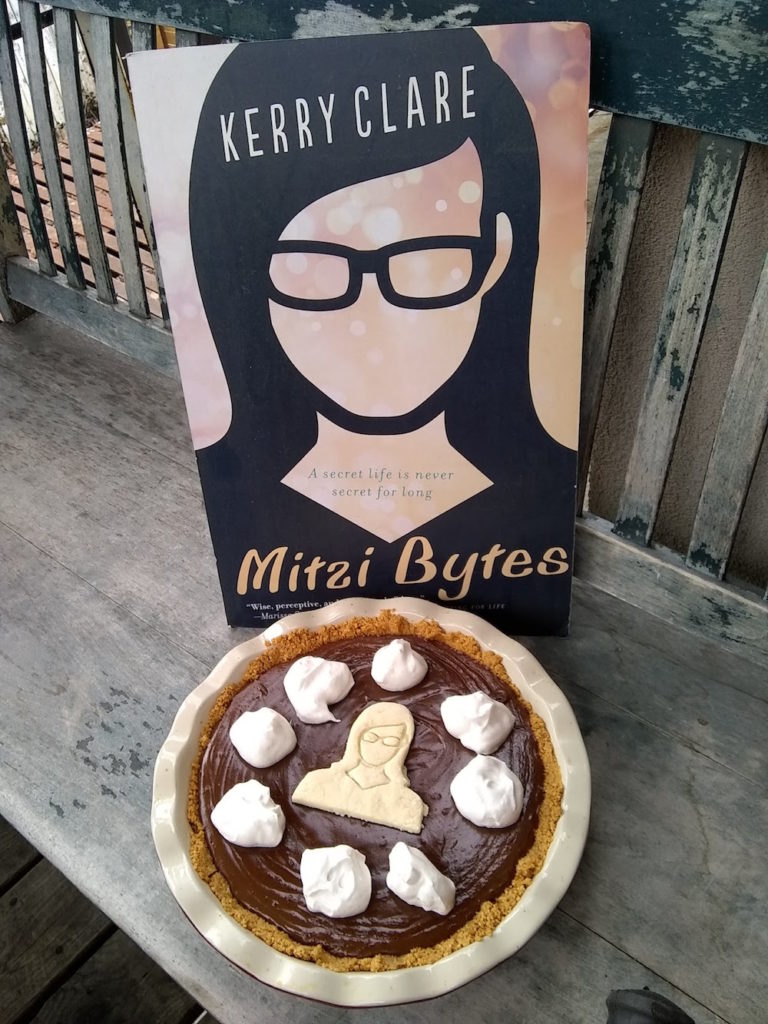
On the occasion of Mitzi Bytes‘ first birthday, and it being Pi Day (which is A VERY IMPORTANT HOLIDAY) I did the only possible thing and baked a chocolate cream pie whose recipe comes from literary comic icon Nora Ephron. The pie was delicious, and there’s even leftovers in the fridge, which is a fantastic way to be. We didn’t light any candles, but it’s still been a very good way to make a special occasion, a year since this novel came into the world. I’m so grateful for all the places it has taken me to, all the conversations its led me to have, and for all the readers who really engaged with the novel and its questions, and who saw the humour too. It’s all been a dream come true.
March 14, 2018
CBC Ontario Morning Book Picks
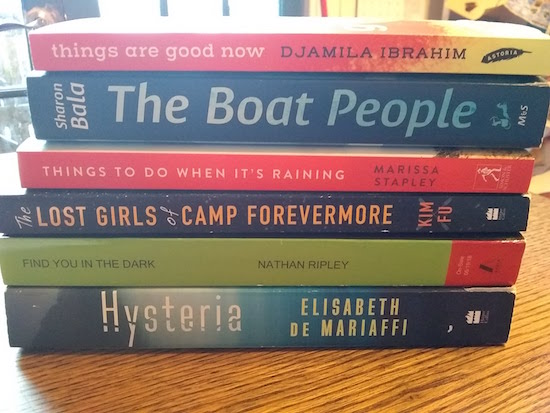
I have been reading so much lately, it’s totally ridiculous, but it means I had a whole lot to talk about on my CBC Ontario Morning books column today. You can listen again on the podcast; I come in at 38.20. Sadly. I ran out of time to talk about Hysteria, by Elisabeth de Mariaffi, which I read on the weekend, but I would have told you that it’s kind of a thriller but so much more than that, a little bit Betty Draper and Mad Men too, about a 1950s’ housewife whose perceptions are called into question (by the reader and everyone) when she starts seeing a ghostly girl and then her young son disappears. Is she really hysterical, as her husband is claiming, or is something much more sinister afoot?
March 13, 2018
More Fun at English Bookshops
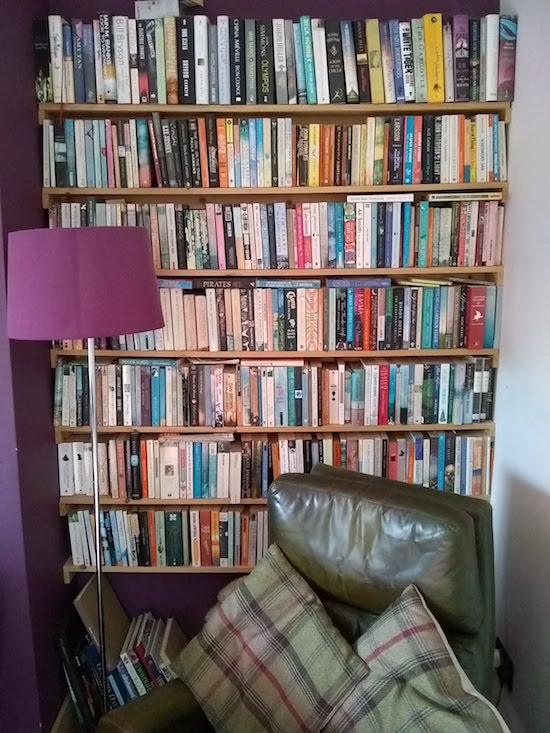
That we only visited three bookshops seems a bit paltry, although a little less so when you consider we were only in England for six days. My only regret is that this time we didn’t get to visit a bookshop on a boat where we were fed Victoria Sponge Cake, but perhaps that can only happen so often in a lifetime. Our trip to England was a little more local this time, focussed on Lancaster where we’d rented a house for a week. A house that came with a wall full of books, which seemed like a good omen—”But don’t let this make you think we don’t have to go to all the bookshops,” I reminded everybody.
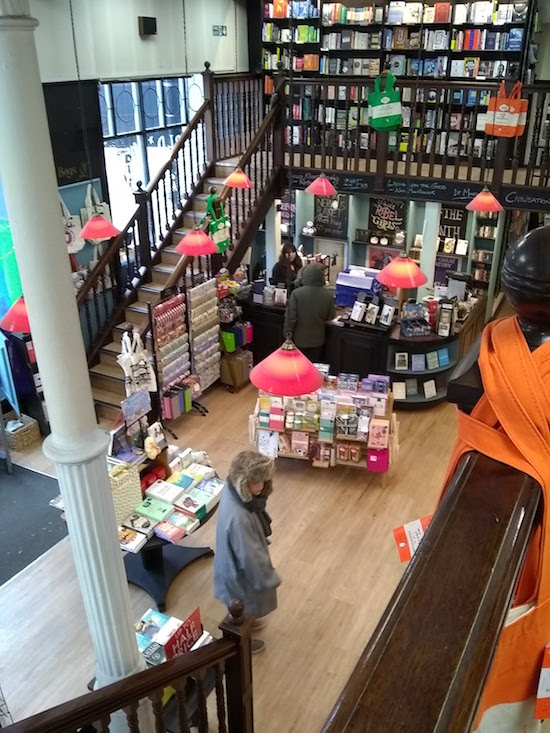 We’d actually visited our first bookshop before we even got to England, because I like the idea of travelling to England with no books, instead picking them up on my travels. Which is pretty risky, actually, considering the decimation of book selection at the Pearson International Airport where there are no longer actual bookshops, and instead a small display of books on display alongside bottles of Tylenol and electrical volt adapters. But I found a couple of titles that interested me, ultimately deciding on Anatomy of a Scandal, by Sarah Vaughan, the story of a political wife whose life comes apart when her husband is accused of rape. A timely book, and it was interesting, but spoiled for me by a “twist” that made this very fathomable story a little bit less so. Which meant that I was all too ready to buy another book at our first English bookshop, Waterstones in Lancaster.
We’d actually visited our first bookshop before we even got to England, because I like the idea of travelling to England with no books, instead picking them up on my travels. Which is pretty risky, actually, considering the decimation of book selection at the Pearson International Airport where there are no longer actual bookshops, and instead a small display of books on display alongside bottles of Tylenol and electrical volt adapters. But I found a couple of titles that interested me, ultimately deciding on Anatomy of a Scandal, by Sarah Vaughan, the story of a political wife whose life comes apart when her husband is accused of rape. A timely book, and it was interesting, but spoiled for me by a “twist” that made this very fathomable story a little bit less so. Which meant that I was all too ready to buy another book at our first English bookshop, Waterstones in Lancaster.
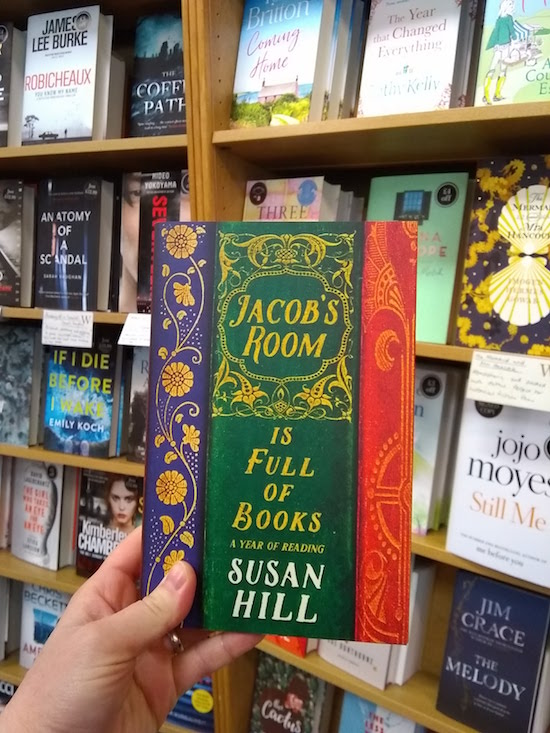
I love the Waterstones in Lancaster. My heart belongs to indie bookshops, but Waterstones is better than your average bookshop chain, and the Lancaster Waterstones in particular, which its gorgeous storefront that stretches along a city block. With big windows, great displays, little nooks and crannies and staircases leading to more places to explore. It’s a gorgeous store, with great kids’ displays too, and my children were immediately occupied by reading and also by a variety of small plush octopuses. I ended up getting Susan Hill’s Jacob’s Room is Full of Books, a follow-up to Howards End is on the Landing, which I bought when we were in England in 2009 and Harriet was a baby and I spent our week there reading it while she napped on my chest. Jacob’s Room… would turn out not to be as good as Howards End…, which broadened my literary world so much (and introduced me to Barbara Pym!). The new bookwas kind of rambling and disconnected and not enough about books, but was so inherently English that I was happy with it.
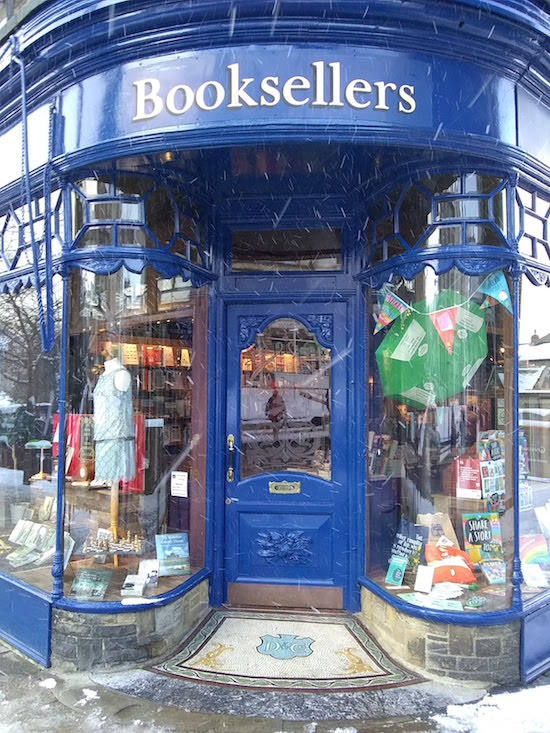
On the Wednesday we drove across the Pennines to Ilkley to visit The Grove Bookshop, which is one of my favourite bookshops ever. It’s located up the street from Betty’s Tea Room, which makes for one of the best neighbourhoods I’ve ever hung out in. After afternoon tea, where the children behaved impeccably, we took them to a toyshop for a small present as reward, which was good incentive for their behaviour in The Grove Bookshop too, where I was able to browse for as long as I liked. I love it there, the perfect bookshops and well worth a trip halfway across the world. I had been in the mood for a Muriel Spark novel since reading this wonderful article, and The Grove Bookshop delivered with The Ballad of Peckham Rye, a new edition in honour of Spark’s centenary. I was also very happy to find a rare copy of Adrian Mole: The Collected Poems, as Mole’s work has had a huge impact in my own development as an author and intellectual.
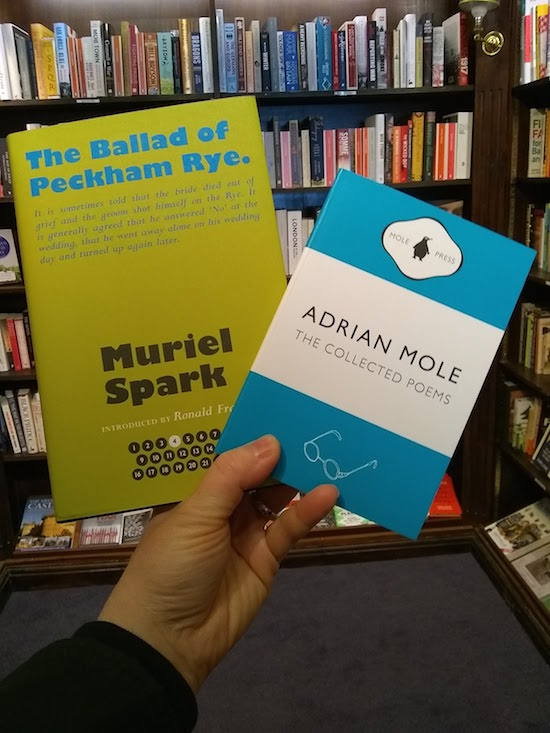
I really loved The Ballad of Peckham Rye, so weird and contemporary in its tone, strange and meta, the way all Spark’s work is. When we’re on vacation, I don’t like getting out of bed, lingering instead with a cup of tea and toast crumbs, and Peckham Rye was perfect for that,
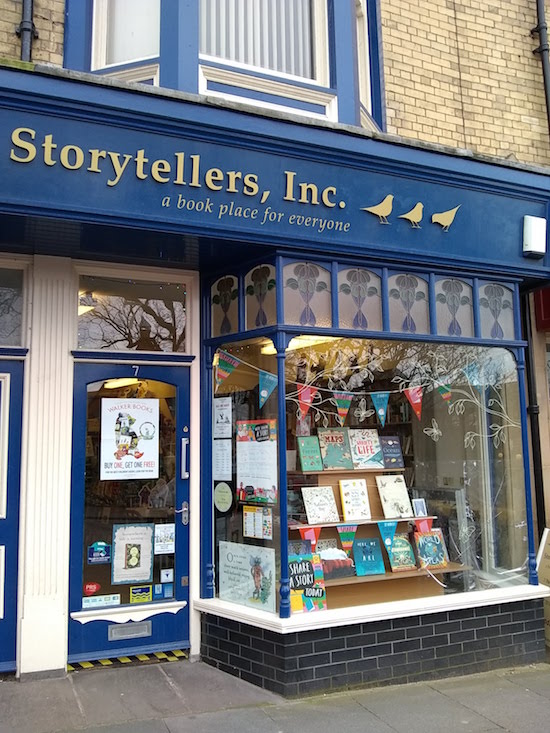
On Friday we went to Storytellers Inc, located in Lytham-St. Anne’s, just south of Blackpool. Originally a children’s bookshop, they’ve branched out to books for readers of all ages, although the children’s focus remains—they have a huge selection of kids’ books and a special kids-only reading room with a tiny door and kid-sized furniture. (Sadly, we’d not brought our kids along with us that afternoon and it would have been weird to go in there without them.) In addition to the kids’ books, they had lots of Canadian fiction, and poetry. We ended up buying Welcome to Lagos, by Chibundu Onuzo, just because we liked the cover. And also Motherhood, by Helen Simpson, because I’d seen it on the shop Instagram page, and then I saw that Emily was reading it.
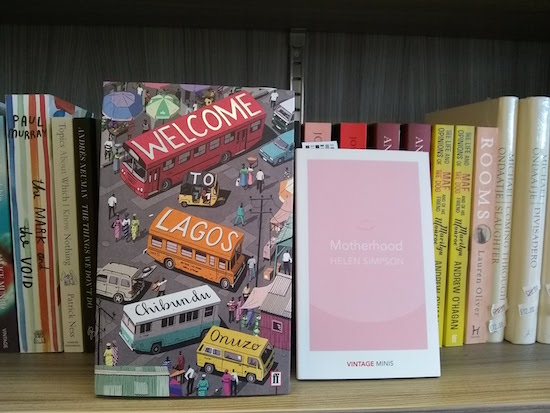
I don’t think I’ve ever read Simpson before, but this is a mini-collection of her stories from a few different books over the decades—and I loved it. Plus there was a boob on the cover. I finished reading it on the plane journey home, and then started Welcome to Lagos, which was really great. It’s Onuzo’s second novel, after the award-winning The Spider King’s Daughter. The latest is about a ragtag crew who arrives in Lagos and attempts to make a life there, in spite of the odds. They end up running in with a corrupt former Minister of Education with a suitcase full of money, and what they choose to do with this fate will make or break their destinies. In this case, choosing to buy a book for it’s cover was a very good decision.
March 12, 2018
Yoko Ono, “The Riverbed,” at the Gardiner
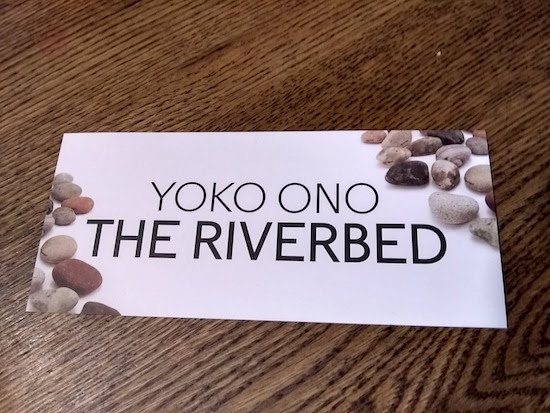
I loved Yoko Ono’s “The Riverbed”, which we went to see yesterday at The Gardiner Museum. An exhibit whose first part is “Stone Piece,” an arrangement of river-worn stones which we are invited to pick up, and contemplate, and (for some of them) to discover words written on their bottoms, and then replace the stones in a different arrangement, the exhibit ephemeral and ever-changing, always moving, like a river itself. Cushions around the display invite viewers to sit down and watch the scene, the way we might want to sit by the side of the river, and the effect is similar—relaxing, interesting, and insightful. It’s a scene where adults and children alike are excited to be taking part in the exhibit, to be a part of things, and watching this is interesting as well.
Next we move on to “Mend Piece”, where broken crockery has been placed on the table and we are invited to put the pieces together using tape, and string, and glue. A fascinating process for so many reasons—because the pieces we’re “mending” weren’t necessarily put together in the first place, the idea that to mend is a creative act, to make something too, how mending is restorative and generative at once. About how out of broken things there can be made something new, and strangers sitting together at the table connect as they share materials, and also as they’re served coffee from the coffee stand that is part of the exhibit. When the “mending” is done, the new object is placed on a shelf or hung on the wall, and thereby viewers now have a piece on display at the Gardiner, which is kind of incredible.
Everything is white, and there is so much light, which, when coupled with the creative acts taking place, allows for lots of thinking—but the soundtrack is the racket of nails being driven into a wall. Which was meaningful to me, being required to think over the noise, which is important. The noise too a reminder of work, the necessary parts of building anything. And the work that’s being done is in “Line Piece,” where viewers can hammer a nail into the wall and tie a string from one point on the wall to another. Which has created the most fascinating space, cushions on the floor again where you can look up and think about the web of string above, the web that would have been different if you’d never come, the web that will be something else different tomorrow. And to stand up too, pop my head up through the web and contemplate the networks of string from above… It’s about connection, and shelter, creativity and possibility.
I wasn’t sure what to expect from the exhibit. Conceptual art can go all kinds of ways, and making the viewer a participant in the process doesn’t always succeed in being meaningful. But I still remember the story of John Lennon falling for Ono back in the 1960s’ when he went to her exhibit and climbed to the top of a white ladder to see a word through a magnifying glass, and the word he saw was YES. After our experience yesterday at “The Riverbed,” now I see how that could happen.
March 9, 2018
Sugar and Snails, by Sarah Tsiang and Sonja Wimmer
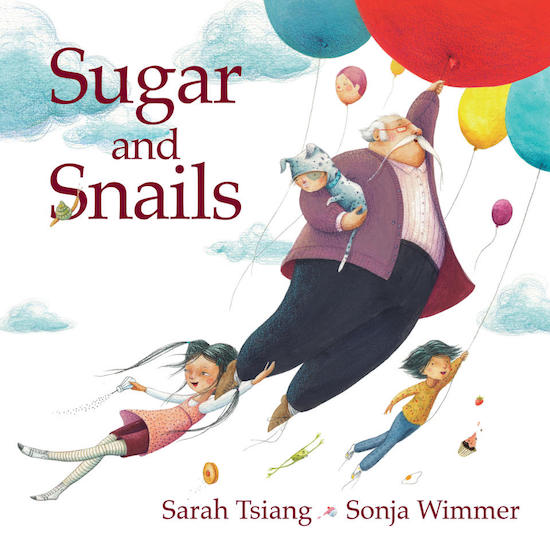
A thing that has surprised me lately is how much so many people seem to have invested in archaic systems I wouldn’t have thought give us much to cheer for, systems like colonialism, white supremacy, and the patriarchy. It’s a thing I’ve only been able to be surprised by, really, because I’ve gone about for 38 years in the world with white skin, an able body, financial stability, among other advantages I’m lucky enough to take for granted, which means there is a whole lot of living that I’ve never seen. Although I’m still a bit nostalgic for a few years ago though when I thought there were just a handful of stupid people who talked about things like “reverse racism,” and we just laughed at them—but now there are hordes who get outraged because a fruit stand puts up a sign that says “Resist White Supremacy.” A UK department store decides not to label children’s clothing by gender, and people go bananas. Which means that this is a particular cultural moment to publish a book critiquing what little boys and girls are made of (“frogs and snails and puppy dogs tails,” and “sugar and spice, and all things nice”), I think. I’m anticipating a backlash to Sarah Tsiang’s new picture book—Sugar and Snails, illustrated by Sonja Wimmer—that involves furious anti-PC women shoving puppy dog tails down their poor sons’ throats.
I’m anticipating the backlash because a) obviously, I’m kidding b) people are stupid and c) what Tsiang sets out to do in her story, she accomplishes so well, Wimmer’s images underpinning the whole project with a foundation of pure magic. (Sarah Tsiang is also author of the amazing picture book, A Flock of Shoes, among others, and magic is kind of her forte.) The book’s first image is a tapestry upon which the traditional rhyme has been cross-stitched, and then we see an older man with a boy and a girl, presumably his grandchildren, and the grandchildren are having none of that gender binary nonsense—the side-eye from the girl when she’s accused of being made of sugar and spice is pretty epic. And her brother wants to know, “What about sweet boys like me?”
But their grandfather is struggling to remember how it goes—”Pirate and dogs and noisy bullfrogs”? Are girls made of “Snails and rocks and butterfly socks?” And suddenly they’re all making it up together, a world where boys are made of “lightning, and newts and rubber rain boots” and girls are made of “boats and whales and dinosaur tales.” Wimmer’s illustrations literalizing the nonsense rhymes so that we see the kitchen filled with water as the boy wades in his rain boots and his sister swims as a whale (and everywhere there are teacups and teapots, which means this whole book is so up my alley I feel like I live within its pages…) There is also a reference to chicken butts, which means the children are totally on board, although they were pretty enthused in the first place. And never before has the patriarchy been bashed with such whimsy and a spirit of fun.
The book concludes with the tapestry image from the first page, but the children have pulled out many of the threads. Which means the work is still half-done, of course. Sugar and Snails inspires us to keep on imagining new possibilities for what boys and girls can be.
March 8, 2018
The Red Clocks, by Leni Zumas
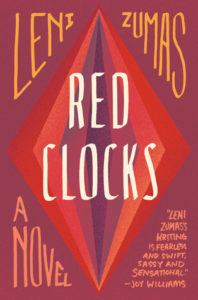 The week before we went away when I was sick in bed, I was reading Leni Zumas’s The Red Clocks, which I purchased after reading the review in The New York Times. I wasn’t reading it with an eye toward review, and I honestly wasn’t sure how I felt about it as I made my way through the novel—it’s a strange narrative, constructed of five different women’s voices that would have been “woven together” in another book, but this isn’t what’s happening here, and it wasn’t until close to the end of the novel that I really understood how the pieces were fitting. I really liked it, this novel about a dystopian America situated a week from now in which abortion is once again illegal.
The week before we went away when I was sick in bed, I was reading Leni Zumas’s The Red Clocks, which I purchased after reading the review in The New York Times. I wasn’t reading it with an eye toward review, and I honestly wasn’t sure how I felt about it as I made my way through the novel—it’s a strange narrative, constructed of five different women’s voices that would have been “woven together” in another book, but this isn’t what’s happening here, and it wasn’t until close to the end of the novel that I really understood how the pieces were fitting. I really liked it, this novel about a dystopian America situated a week from now in which abortion is once again illegal.
“She was just quietly teaching history when it happened. Woke up one morning to a president-elect she hadn’t voted for. This man thought women who miscarried should pay for funerals for the fetal tissue and thought a lab technician who accidentally dropped an embryo during in vitro transfer was guilty of manslaughter. She had heard there was glee on the lawns of her father’s Orlando retirement village. Marching in the streets of Portland. In Newville: brackish calm.”
It’s fitting, really, that I was unable to see how the voices in the novel were fitting together, because I don’t think they were supposed to fit together. Zumas does interesting things with the idea of women being in competition and opposition with/to each other, and how difficult it is to support other women who make different kinds of choices. Mostly because, I think, we’re often told that there is not enough to go around and that becomes a self-fulfilling prophecy. But the point of the The Red Clocks is that ultimately, our fates are all connected whether we like it or not, and that as a woman there is very little that can happen to women that in the end has nothing do with you. Zumas makes this all the more meaningful by connecting fertility and infertility to the abortion question, which I’ve realized it really should be, all being about questions of choice. In the book, a high school teacher has to figure out whether or not to help her student obtain an illegal abortion, all the while she is undergoing to fertility treatments (but not IVF, which has been outlawed) and being made ineligible to adopt at the government brings in rules stipulating that all adopted children have two parents (because what are all these laws about but keeping women from controlling their bodies and shaping their lives after all…).
There’s a whole lot more to it than that, fascinatingly, and it’s all very stranger and weirder than you might expect, but also not at the same time. I liked this book a lot.
March 7, 2018
Women who say no
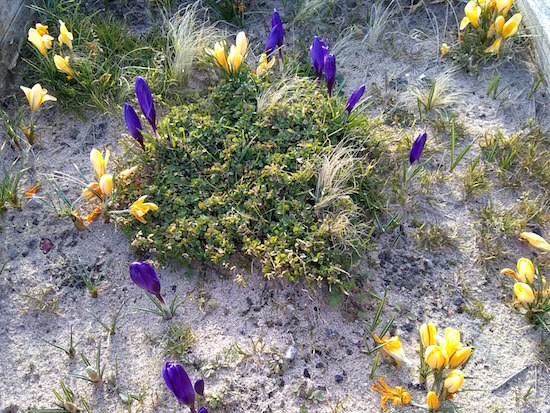
The most feminist thing I’ve done lately was send an email including the line, “It sounds like a great event, but to do the job effectively it would take up a bunch of my time and I can’t afford to do that for free.” A line that sounds straightforward in its delivery, not unfriendly, and kind of obvious, even, but to write that line was the result of a whole lot of thinking and some necessary urging to do something that was brave. Because I think that we all need to do a better job of valuing women’s time. People in general need to do this, other women need to do this (i.e. stop sending messages to strangers asking if you can buy them a coffee in exchange for “picking their brains” [and ew!]), and many of us need to do a better job of doing it on our own behalf. Which is to say, we need to start feeling okay about saying no to opportunities that aren’t valuable ways of spending our time. We have to stop feeling obligated to say yes, to help out, to step in, and be of service. Women have to stop feeling grateful to be asked at all, to be noticed.
But it’s complicated, of course. Ten years ago I recall requiring all the opportunities I could get as I was building my writing c.v, and any visibility at all was a huge deal, a confirmation that I existed as a writer. I also am eternally grateful to many people (mostly women) who’ve been so generous toward me with their valuable time over the years, writing guest posts for my blog, reading my manuscripts, having me interview them, who’ve written reviews of my work for pennies or even for free, and who—out of the goodness of their hearts and for community building purposes—have organized events I’ve been lucky to take part in. If everybody was always putting a monetary value on creative work and the hours in their day, I don’t know that I’d have gotten anywhere at all.
And so this is the reason why I’m always happy to repay favours, to support friends, to write effusive blog reviews about a book I’ve no connection to except that I really really love it and I think everybody needs to know about it too. As a blogger, I don’t get paid for my creative work on a regular basis—and I’m okay with that, because I’ve found other ways to make my blog useful for me and also my blog has led to paying professional opportunities to supplement the work I don’t get paid for. (I also really like blogging, and the opportunity to spread the word about books that I love.) And as an author, I’m happy to do anything at all to promote my book—I will write an article, answer your Q&A, rent a car and drive to Durham Region, and even consent to talk on the telephone (which, in my opinion, is asking a lot). I know there is not an abundance of money in the publishing industry, and most of us are doing most of what we’re doing out of goodwill anyway.
But I still think it’s a lot to ask someone to host an event, for example, to launch a book whose author one has no connection to. That’s an evening out of my life, cost of transit, plus all the preparation to make sure I do the job properly, plus all the necessary anxiety that goes with standing up in front of a room full of people (and the matter of hair and make-up, and what I am supposed to wear). It’s also a lot to ask me to read your manuscript. It’s a lot of ask me to be a juror and read the 12 books on the shortlist for your book prize. It’s a lot to ask me to answer your list of questions about how to make it in publishing, or to interview you at your book launch or on my blog, or to blurb your novel by Sunday.
If you are my friend and/or I admire your work, I will probably be happy to do these things, to pay forward the goodwill I’ve been fortunate to benefit from over the past decade. If I have actually agreed to do any of these things for you in the future or the recent past, it was because I wanted to. And I do think that if people want to make these requests of writers, they should feel free to do so—what’s the harm in asking? But they should also be cognizant of just how much they’re actually asking for (a lot!), and be both comfortable and unsurprised when the person being asked declines because of the reality they’d be getting absolutely nothing out of the experience.
I’ve never forgotten Lynn Coady’s 2012 article that pertains to this very issue, about how liberating it is for a writer to learn to say no: “with every ‘no’ that’s uttered, the easier it becomes to swim past the breakers of passive-aggressive reproach.” I think that Coady’s article is also an article that only a woman could have written—valuing men’s time seems more instinctual for many of us; in general too, we tend to ask less of male writers, who have fewer expectations upon them to be available, accessible, because they’re so busy holed up in their garrets being geniuses instead of relatable; and because of the garrets and not being relatable, they’re probably more adept than women writers are at saying no and then not feeling badly about it for days and days.
Along with all the women who’ve supported me and my work, the women who’ve said yes, I am also grateful for the women who’ve said no, for the example they set for the kind of savvy and self-preserving, self-respectful artist human I want to be.
March 6, 2018
We Went to England!

When I go on vacation, I usually like to put up a post and tell you so, to remind readers that there is indeed a human being behind this blog who sometimes needs a holiday, and also so I don’t leave you hanging (and having to head over to Instagram to find out just what I’ve been up to in the last five minutes). But about three weeks ago, I made the fatal error of noting that I hadn’t been ill or even really had a cold in ages and ages, which meant it was inevitable that I’d become sick a few days later. Three days before we were set to depart for a trip to England, I was in terrible shape and confined to my bed, and the prospect of an international flight seemed impossible. Fortunately two days in bed meant there had been some kind of recovery, in that I no longer felt like I’d been hit by a truck, but I had to lie down frequently on the way to the airport, and by the time we got there I’d developed a fabulous rash all over my face. So all this is to explain just why a review of Kim Fu’s The Lost Girls of Camp Forevermore has been hanging out here for ages. But then it’s such a terrific novel, maybe/definitely it deserved to be.

But the better part of the story is that we went to England! And losing an entire night of sleep left me so discombobulated that my body forgot I was sick and the rash mostly cleared up, and we were ready for all kinds of adventures that would not be deterred by the weather event titled, “The Beast from the East,” to be followed by the less-intimidatingly named “Storm Emma.” We were happy to be staying on the northwest coast, where the weather conditions were not so severe, and really just meant that everywhere we went we didn’t have to queue for things. Our AirBnB was in Lancaster, and it was fantastic—with an actual hot tub. And it was not so wintry on our first day there, where the sun was shining and there were flowers in the windows. We explored the city centre, happy to be in the company of Stuart’s mom and sister, and our tiredness mostly just had the effect of making us all laugh hysterically at stupid things. We hiked up to Williamson Park, which afforded beautiful views of the city, and delighted in the butterfly house and the animals in the zoo there, and then took turns on the zip line.

On Tuesday we drove (our amazing little Mercedes hire car!) to Stuart’s town by the sea, and had ice cream cones in frigid temperatures. We had our first experience looking for English beach glass, until the beach got too cold and we had to go in.
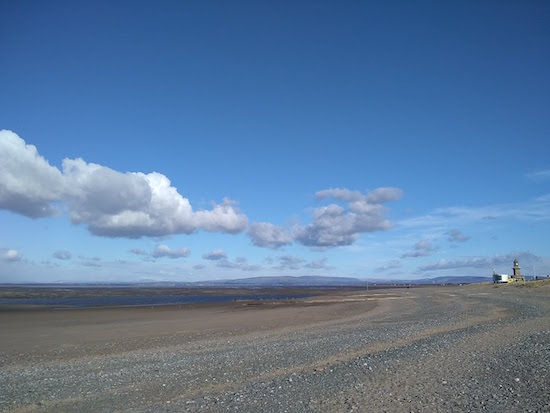
On Wednesday winter had arrived with a vengeance, and we took in the snow-covered hills of Yorkshire on our way to Ilkley, which is one of our favourite places in England, where we partook in afternoon tea at Betty’s and on the way home the kind people at the Pennine Service Station all worked together to figure out how to open our bonnet because we’d run out of windshield fluid.
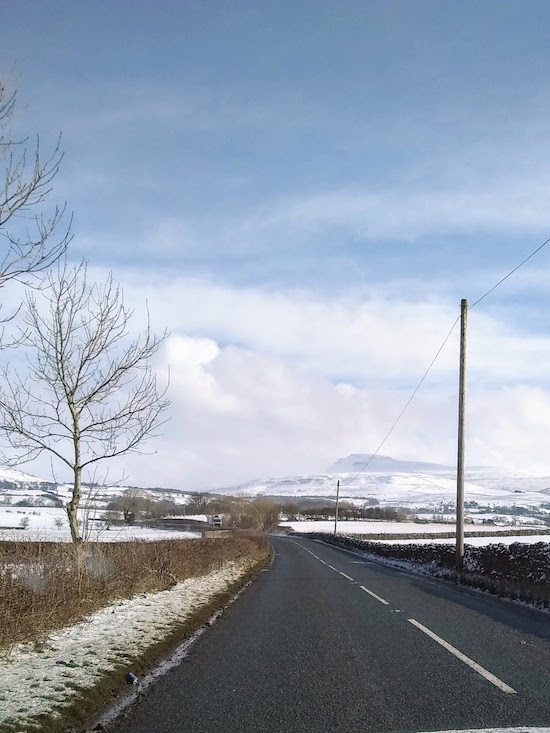
On Thursday, we all went to Bowness in the Lake District to see the Beatrix Potter Attraction and eat lamb shank in a pub, and we had the best scone of the week (we had many) at the Cornish Bakery there.
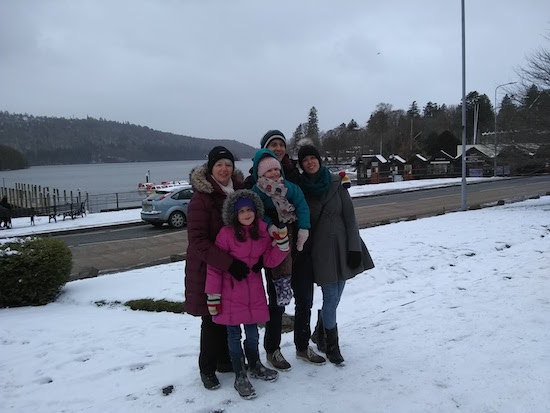
And on Friday we had another pub lunch (our children are confused and now thinks their auntie only has lunch in pubs) followed by delicious ice cream cones, and then Nana and Auntie Jen took the children to the Blackpool Sea Life Centre while Stuart and I went looking for bookshops. (More about the bookshops in a following post.) And then back to Stuart’s parents’ house for fish and chips, which were so delicious.
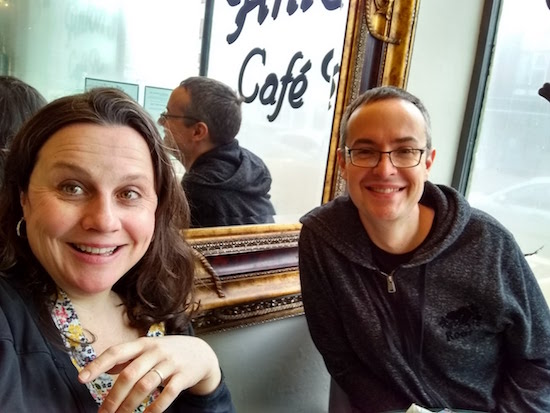
On Saturday, we went into the city centre for the Magic of Harry Potter Exhibit, and Harriet got to hold an owl whose variety was the British Little Owl, which is the cutest name ever. And then one more pub lunch with Auntie Jen—this time with a cheese board—and we really loved Lancaster so much. Then we drove back to Stuart’s parents’ down the narrowest road of our entire vacation (which is saying something) and I wasn’t even terrified. We spent our last afternoon there, and I got to read the Saturday Guardian (with all the supplements!) and then had a roast dinner before heading to Manchester for an airport hotel stop. And then getting up at 5:30 am (but they were already serving our continental breakfast and we got to have it!) and heading to the airport for the long trip home, via Amsterdam, where we had the most delicious lunch in an airport ever, and then I spent $17 on cheese.
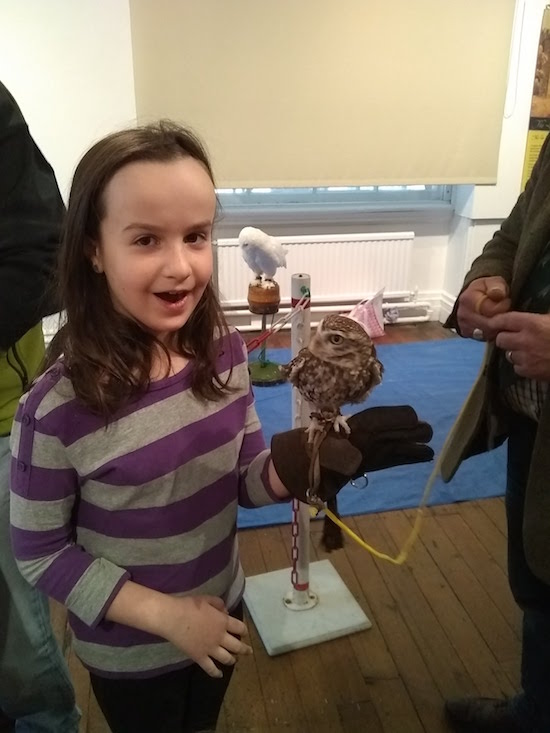
It was a wonderful week, so good to see our family, discover new places, and eat delicious things. And now we’re back and getting over the jet lag, and happy to settling into ordinary life again, and to be reminded that ordinary life is pretty darn nice.
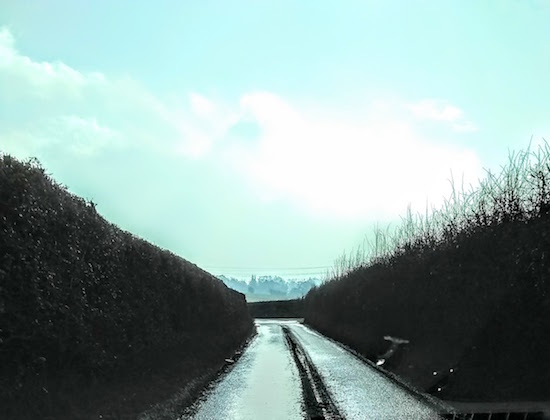
February 22, 2018
The Lost Girls of Camp Forevermore, by Kim Fu
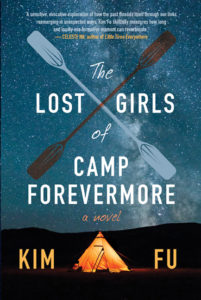 I’ve read twelve books this month (so far!), barrelling through each one with gusto. They have been so good and I haven’t encountered a bookish dud in weeks and weeks—which meant that Naben Ruthnum’s recent tweet really resonated with me: ‘You haven’t “lost the ability to read,” you are just being lazy. Fuck the neuroscience, leave your phone in the other room and have some discipline.” YES. Or else you’re reading all the wrong books? Maybe I should be selecting your books for you, books that will recovery your ability to read—and top of the list is Kim Fu’s second novel, The Lost Girls of Camp Forevermore. It’s a novel shaped like no other novel I’ve read before, original, heartbreaking, subtle and resonant. Packing a whole lot of story into a couple of hundred pages, I have no doubt that this will be one of the best books I read this year.
I’ve read twelve books this month (so far!), barrelling through each one with gusto. They have been so good and I haven’t encountered a bookish dud in weeks and weeks—which meant that Naben Ruthnum’s recent tweet really resonated with me: ‘You haven’t “lost the ability to read,” you are just being lazy. Fuck the neuroscience, leave your phone in the other room and have some discipline.” YES. Or else you’re reading all the wrong books? Maybe I should be selecting your books for you, books that will recovery your ability to read—and top of the list is Kim Fu’s second novel, The Lost Girls of Camp Forevermore. It’s a novel shaped like no other novel I’ve read before, original, heartbreaking, subtle and resonant. Packing a whole lot of story into a couple of hundred pages, I have no doubt that this will be one of the best books I read this year.
Imagine a novel about summer camp, about a kayaking trip gone terribly wrong, a novel that holds within it the span of a life like The Stone Diaries did, except there are five lives. Nita, Andee, Dina, Isabel and Siobhan. Ten-years-old, the dynamics between them are complicated, alliances and enemies emerging in the relationships between any relationship proper. And then the first chapter ends, and the reader finds herself sweeping through the next three decades of Nita’s life, what happened (or, as the book is constructed, is still going to happen) at camp just one detail among many that informs the person who Nita becomes. Or is it so incidental? Which is the question about which Fu’s narrative hangs.
Every other chapter outlines chronology of the camping trip, interspersed with the story of who each girl becomes—puberty, high school, friendships, sex, independence, marriage, motherhood—years and decades going by at a clip but Fu pinpoints her details so well that these chapters are each like a novel in themselves. (Some of the girls’ lives are more elusive than others; we see wha happens to Andee, the “scholarship camper” through the prism of her sister’s experiences.) And then once we get to end of the novel and know what happened to the girls on their trip, those children, those hapless (maybe?) re-enactors of Lord of the Flies, each woman’s story is cast in a different kind of light. And just a note that what actually transpires on the trip is kind of banal in its disturbingness—or is it? Is it more disturbing that this story is banal? All of which is to say that those with an aversion to stories about children in peril need not avoid reading this book. Nick Cutter’s The Troop this is not, and they don’t encounter any witches in gingerbread houses. That they don’t need to is a testament to Fu’s craft though, as she is making a lot here out of very little. Or making a little out of a lot, and this is the question the novel hangs on in the most fascinating way.
February 20, 2018
Ten Years on Lucky Street
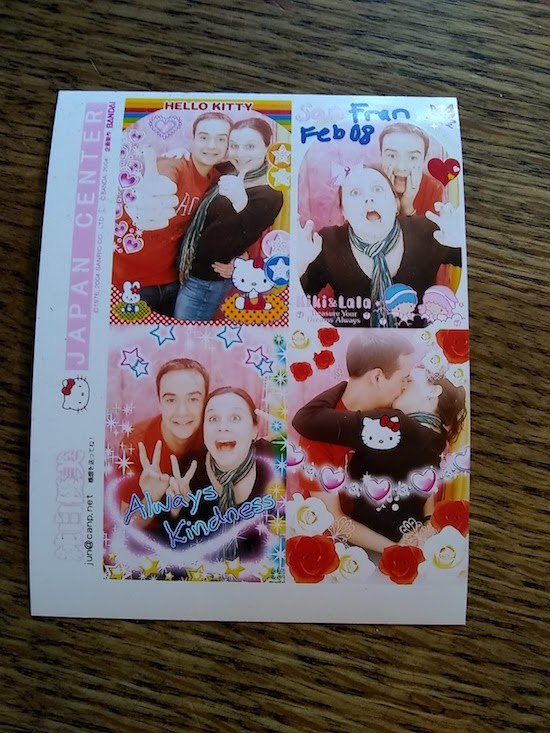
All last week I was nostalgic for ten years ago, our miraculous trip to San Francisco. 2008 was an incredible year, somehow the pieces having come together for us enough that we could fly to California on a whim. We were both making good salaries, beginning to leave our nomadic twenties behind us with relief and gratitude, lived in a city we loved with many good friends—and, beside the point, but still it was kind of magical, I was also effortlessly thin, which is nice for a person to experience a few times in her life. Of course, not everything was magic—we were still in our twenties enough that our jobs made us bored and unhappy; I had written a novel that wasn’t the triumph I was hoping my creative writing masters degree would culminate in; it was the grossest, iciest winter ever, and you couldn’t walk up the sidewalk without falling; plus the neighbours in the basement kept having explosive arguments, terrible crashes as they’d hurl their “LIVE LAUGH LOVE” and “JOY AND PEACE” signs at each other in the middle of the night. We were going to have to move before one of them set the house on fire, and besides, we wanted to have a baby, and do something about our jobs because if we didn’t they could last forever and that was not the kind of life either of us wanted to live. 2008 was the edge of everything, particularly meaningful as we sped down the Pacific coast on the edge of the continent in a rental car, and we knew it in the moment, so much of what we were experiencing rich with significance, possibility and lasting effect. Nothing was inevitable and anything might happen.
I’ve written before about the very first Family Day in 2008 when, high on California, we decided to make some changes about the way we were living our lives, and these changes set us on the course to this precise moment. Ten years ago this April we moved into this apartment, which has been so good to us, the most wonderful home. Dreaming of the children we were going to have, the first a daughter who turns nine this spring. Ten years ago this summer we painted her bedroom, which she now shares with her little sister, sleeping in a bunkbed that’s far too big for the room, because we didn’t measure it, but then we never measured anything. Which makes the miracle of how well it’s ended up fitting together all the more momentous. We have been so lucky—those two funny people doing prikura in the Japan Centre Photo Booth in San Francisco thought they knew, and they kind of did, but they had no idea either.





